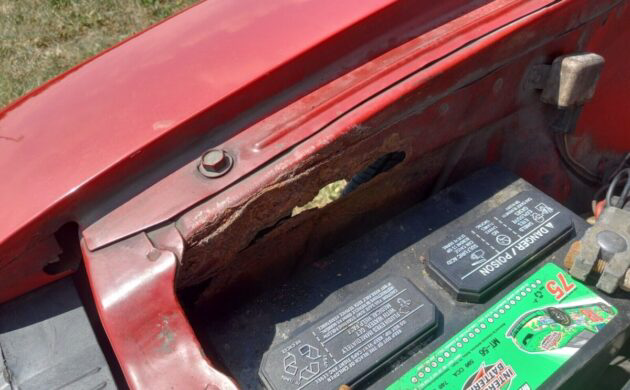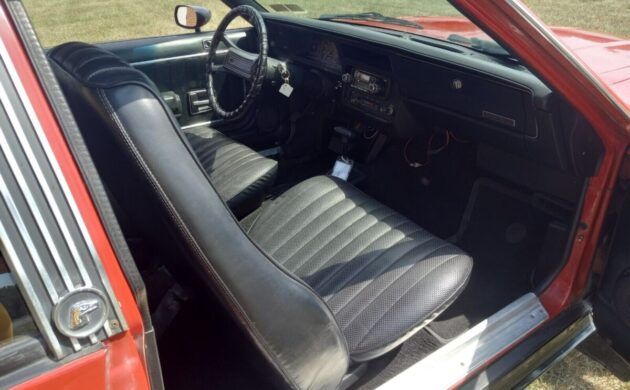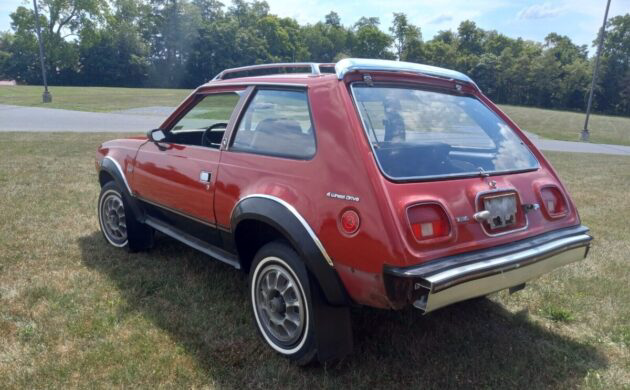In the late 1970s, American Motors Corporation was clinging to life based on just a couple of brands. It had Jeep, of course, and the Hornet (Spirit, Concord) platform. But the oil crisis nearly killed Jeep. Gerald Meyers, then-CEO, believed AMC should capitalize on other auto makers’ abandonment of the four-wheel-drive niche. Meanwhile, AMC had a gas-thrifty automobile platform in the Hornet line. In a stroke of brilliance completely incongruous with its past errors, the company created the first crossover, called the Eagle. Thanks to tight finances, the new car was a derivative – basically, a Concord body installed on a four-wheel-drive system. The Eagle operated in all-time four-wheel-drive but offered car-like amenities including chrome trim, overstuffed seats, fabric door panels, and carpet. Here on eBay is a rare 1981 AMC Eagle Kammback for sale, bid to $1,525, reserve met. The car is located at the AACA Museum in Hershey, Pennsylvania. Astonishingly, despite the presumed knowledge on the part of the selling museum, it has misidentified this car as an SX/4, a more common variant of the Eagle line. Our own Russ Dixon just covered an SX/4 here; compare and contrast!
Further confounding wannabe Kammback owners, the ad is bereft of detail. There is no full engine bay photo. However, we’re told that the motor is the 2.5 liter General Motors “Iron Duke” inline four-cylinder. This motor was used starting in 1981; prior to that, you had to settle for an AMC four-cylinder. The”Iron Duke” made about 90 bhp, and was paired with a three-speed automatic. This portion of the engine bay shows that rust has invaded the metal. Yes, alas, this orphan has managed to defeat its galvanized coating, “lustre guard” and “deep dip primer”. Rust! More rust. And, still more rust. The underside is not revealed to us but it may be truly cringeworthy. Slightly offsetting the regrettable rustiness is that a pair of used fenders come with the car – of course consigning the buyer to a paint job.
On the other hand, the interior isn’t bad. The back seats are quite nice as well. The seller indicates that the brakes will need to be fixed. The car does apparently run and roll well enough to mount a trailer.
This body style was considered the “sport coupe”; there was also a sedan, a liftback, and a wagon. I can’t resist mentioning that the Eagle SX/4 variant actually rallied successfully, particularly in its first couple years out, 1981 and 1982. Ok, got that out of my system. Now as charming and rare as this car is, the rust is a real impediment to happy ownership in my book. What do you think?








Fantastic write-up, Michelle! I just about jumped out of my skin when I saw this one as they rarely come up for sale and I’ve wanted one for years, but then I saw the photos and it’s a bit too rough for me. I was also shocked to see the AACA Museum refer to this car as an SX/4.
Keep up the great work!
High praise coming from you, thanks so much Scotty! Yes, I was about to swipe it myself – kinda rare car and I’ve had half an eye out for an Eagle of some sort – but the rust!
But it’s “Museum” quality,coming from one.
ran as parked?
I remember as a kid when Eagle gave the Gremlin its wings and called it a Kammback. The SX4 was much more popular next to the Sedan and wagon models. Of the few Kammback models I have seen they always had the iron duke. Could the 258 even be ordered with this model?
Yes, my uncle had a maroon one 4speed on the floor with a 258 inline 6. I put many miles on that car, it was a tank. Was not a good cruising the boulevard car, but it was wheels.
I have a 1981 Spirit Kammback. It has the 258 Inline 6 with an automatic transmission. I will most likely turn over 19000 original miles when I travel to the next show. It is always the only Kammback on display if other AMCs (outside of our family’s cars) are in attendance at all. The national show in Gettysburg was the first show I ever took it to after I purchased it. It carries the Spirit label and is a two-wheel drive. Most people will look at it from the front and identify it as a Spirit. Those that only see it from the rear identify it as a Gremlin. I must persuade them to walk around the car to appreciate its uniqueness.
Yes, they came with the 258.
I HAD a long-time friend, that went nuts with political baloney, so consequently, not my friend anymore,,, he bought a new ’82 SX4 this same color. It had a 258/6 and the 5 speed. The 5 speed was nothing but trouble and eventually why he traded it. Other than that, it was a good car. This is, I think, the last rendition of the good ol’ Gremlin that we would see. AMC sure got their moneys worth out of the Hornet, kind of the “Falcon” of AMC. The rust would scare me, I don’t think they came from the dealer without it. It was a good car, I just think people had enough of AMC, no matter what they made. They were no match for imports. Say what you will, management, workers, outdated plants, it was the Asian imports that killed AMC, thank you, and partially why I’ll never be seen in an Asian vehicle. If you grew up in Milwaukee or Detroit or any automotive city that took a hit, in the 80s,, seeing your neighbors( or you) lose their jobs, you’d feel the same way. These gave AMC a small rally, but I believe Renault was taking hold, the real kiss of death for AMC.
BTW, I believe only certain body parts, like rocker panels were galvanized plus properly applied undercoating helped some. Nothing except stainless steel beats rust. Limited interest here.
“political baloney”. Your right, sounds like a sandwich I wouldn’t want to eat. Tell me, did it come with hot or cold sauce? Either one makes it inedible. Those kind of eats should only come with a nice mild condiment that almost everyone can tolerate, but people only want to serve you what they like. Many like to shove it down your throat and say, “See, isn’t it great!” Howard, what are we going to do? I am starved for something good, but the menu only seems to have extremes.
Imports were certainly a factor in AMC’s decline, but AMC management didn’t do the company any favors. In hindsight, money spent on the 1974 Matador coupe and the 1975 Pacer would have been better spent to update or replace the Hornet and Gremlin. The Matador was too ugly for mainstream buyers, and the Pacer was hampered by odd styling, GM’s decision to stop development of their Wankel engine, and AMC management’s decision to beef the car up for anticipated crash regulations that never materialized. Additionally, AMC depended on lucrative defense contracts, and when those contracts started to dry up, there was very little money for development of new models. By the time imports really started to eat US automakers’ lunch, AMC had been living on borrowed time for years.
In the ads photo section there is a picture of the 2 wheel drive to 4 wheel drive button. Says, STOP VEHICLE, PULL (lever), ENGAGE (4wd). So I have to assume this Eagle can “fly” in 2wd also. Not all time 4wd. Just sayin…might be a neat little winter beater. 🙂
All Eagles had full-time 4wd. That is, they had a center differential and could be run in 4wd mode on dry pavement. The front axle could be disengaged starting in 1981, but it was still technically a full-time system.
The last reincarnation of the 1970 1/2 AMC Gremlin chopped Hornet/Concord unibody. AMC put the body on a 4 wheel drive jeep-like platform and enlarged the rear side windows eliminating the Gremlin hockey stick window line. Also, after the CEO of Renault was killed by Marxists the new Renault CEO decided retreat again from the US car market. As the minority 49% owner of AMC stock, Renault had in effect controlling interest and sold AMC to Chrysler in 1988. AMC had 2 assets that Chrysler wanted (1) Jeep and (2) North America’s (Canada) newest high-tech auto plant built with the cash AMC got from all the new shares that had been sold to Renault. Of course, AMC’s old (Nash-Kelvinator) factories in Kenosha were quickly abandoned by Chrysler.
AMC used the Iron Duke starting in 1980 until 1982. After that they made their own 2.5L 4 in 1983 and it was used all the way up to 2002 in AMC/Eagle/Jeep/Dodge. The AMC was more powerful than the GM with 105 to 120 HP. They only made about 6100 of the Kammbacks in 2 years
I learned something new today. I never knew AMC had their own four cylinder. My 1980 Spirit had the iron duke and I thought it ended there.
Nash and early AMC had the Nash Healey and Nash/AMC Metropolitan that had an Austin 4 cylinder engine. Kaiser-Jeep I believe bought all their engines from other companies except a Jeep 4 cylinder that I believe was sold off to GM? shortly after AMC bought Jeep around 1970. I didn’t think that AMC had an AMC 4 cylinder. I know in some years to get better gas mileage they used some GM Iron Dukes and I believe an Audi 4 cylinder engine in some of their compact cars (Gremlins, Spirits or the Eagle 4wd versions of those small cars). If they had a 4 cylinder was it a chopped AMC straight 6?
The AMC 2.5L I-4 wasn’t just a chopped I-6, but they did share some common dimensions, components, and component locations to facilitate assembly on the same lines with the same machine tooling.
https://en.wikipedia.org/wiki/AMC_straight-4_engine
The NashHealey used the Ambassador six.
It looks like a big Gremlin. Maybe a Gremlin on steroids?
See my previous comment, it was AMC’s last Gremlin derivative, same unibody with rear side windows enlarged.
Cadillac Diva ? ? ?
I had a 1981 wagon, 258 6 cylinder, Auto. It was full time four wheel drive. All the bells and whistles. It would go anywhere in the mud and snow. Nice car, unfortunately it rusted to hell ! Ended up junking it. Miss that car !
AMC had the rights to an Audi/VW overhead cam 4 cylinder. One of the Pacer’s problems was it was not very frugal with gas. A friend had an SX/4 which he liked thrashing on snow-packed streets. It had the five speed and the clutch was troublesome. Some AMC experts advised that the hydraulic clutch was cylinders were the main problem.